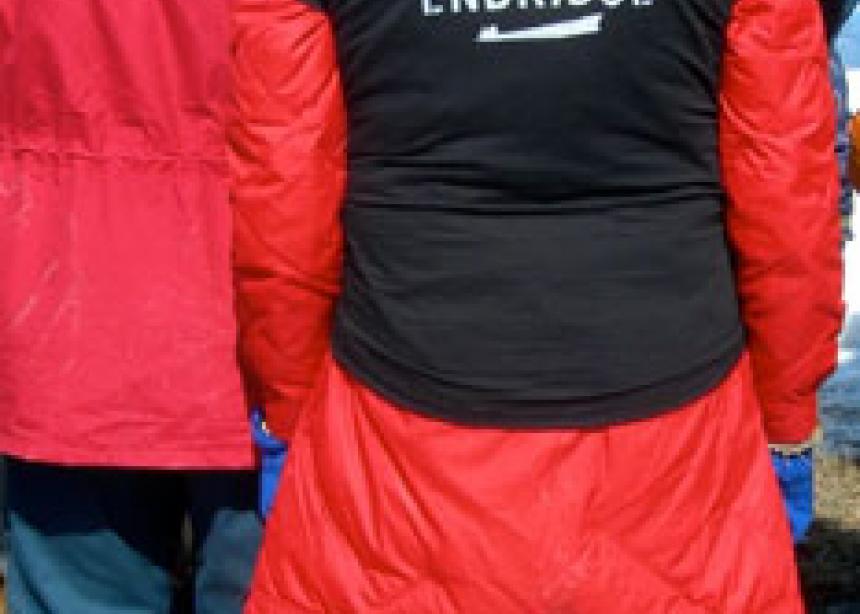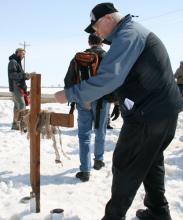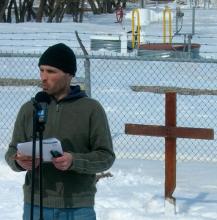A cross in the ditch is a common marker for tragic events, so on Holy Saturday, March 30, a wooden cross is planted in the snowy ditch just outside the chain-link fence of the Enbridge oil pumping station near Gretna.
Erica Young, one of the organizers, welcomes the group of about 60, mostly from Mennonite congregations, to a service of lament, saying, “This is . . . a day between anguish and redemption, a space between loss and hope, a holy space, and on this day in this place we stand here where oil flows beneath our feet.”
As roughly 80,000 barrels of oil course silently through the earth beneath them, those in attendance reflect on how this place connects them to people and places across the continent, to the indigenous people and their lands in northern B.C. that are threatened by the proposed Northern Gateway pipeline, and to a similar group gathering at the same time approximately 1,500 kilometres further along the same pipeline system at The Hermitage near Three Rivers, Mich.
The Hermitage, a Mennonite-run retreat centre, “is lamenting the fact that the pipeline corridor through their woods will soon be expanded and widened, requiring the clearing of more trees, the loss of beauty and stillness,” says co-organizer Will Braun, explaining that Enbridge plans to widen its corridor there in order to increase its capacity from 240,000 barrels a day to 500,000.
At the Gretna Enbridge pumping station, six buried pipelines form part of “the largest single conduit of oil into the U.S.,” according to the company’s website.
“We stand here humbly, before the complicated reality of oil,” says Young, who leads the group in worship. “Today, we take a step back from our need to fix and solve. We put aside forced optimism. We will not look on the bright side. We will name the darkness. We will walk in the valley of the shadow.”
The lament continues with young and old alike receiving the sign of the cross marked in ashes on their foreheads and strips of sackcloth tied around their arms. Participants call on God “to stay with us in this space between loss and hope. Our anguish at the intrusion of these pipelines and our enchantment with all the comforts that oil brings, these, too, we hold in tension. . . . We long to have these problems solved and know ‘what next?’ but for now we sit with the discomfort and resist the need for answers.”
For Braun, “it seemed right to stand in the presence of pipes and pumps to lament. It seemed right to draw on religious tradition, not as backing for a fight, but as a path into the depth of the issue, a depth from which the creative power of change can rise.”
As the children and adults return home for their Easter gatherings tomorrow, they leave behind the cross, strewn with strips of sackcloth waving in the wind, with the hope “that something creative and new will emerge from this place and this time together.”

A crowd of about 60 people of various ages, almost all from Mennonite congregations, gathers outside the chain-link fence of the Enbridge pumping station near Gretna, Man., for a service of lament on Holy Saturday.






Add new comment
Canadian Mennonite invites comments and encourages constructive discussion about our content. Actual full names (first and last) are required. Comments are moderated and may be edited. They will not appear online until approved and will be posted during business hours. Some comments may be reproduced in print.